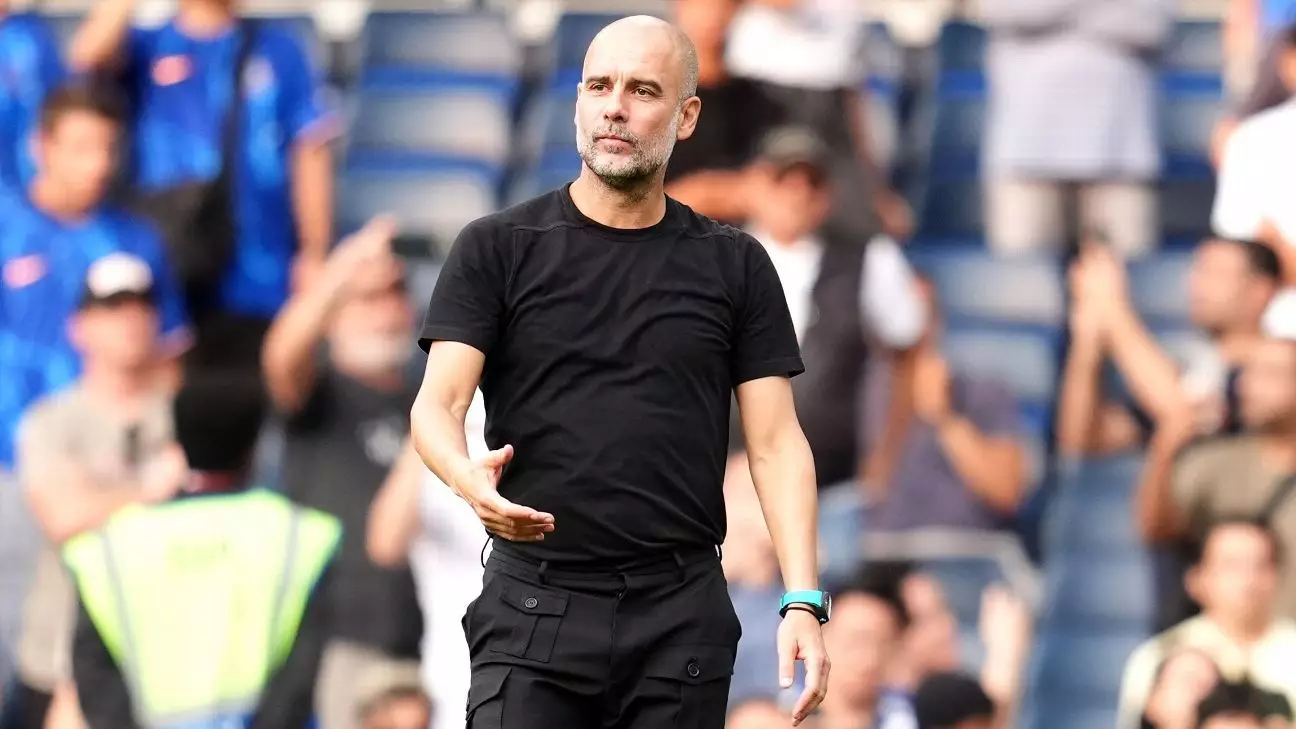In the volatile realm of modern football, the bond between a coach and club can be tested by myriad factors, particularly when facing external challenges like financial inquiries. Pep Guardiola has recently articulated his unwavering loyalty to Manchester City in the face of serious allegations that could jeopardize the club’s standing in the Premier League. This commentary from Guardiola is not merely a display of bravado; it instead reflects a profound commitment that runs deeper than professional obligation.
Guardiola’s declaration of his “deep” bond with Manchester City sheds light on a managerial ethos that extends beyond tactical formations and match day strategies. His assertion that winning games is the most effective way to defend the club suggests a philosophy where success on the pitch serves as both a shield against criticism and a signal of unity with the fans and players alike. In Guardiola’s view, the essence of defending the club lies in performing at the highest level, thus diverting focus from off-field controversies.
This perspective is particularly significant given the ongoing investigation into Manchester City for 115 purported breaches of financial regulations. The potential outcomes of such allegations could range from substantial fines to points deductions, or even relegation—a scenario that could severely tarnish the club’s reputation. Still, Guardiola remains resolute in his trust for the club’s hierarchy, emphasizing a bond forged over years of collaboration and shared ambition. His comments imply that he believes in the integrity of the leadership, creating a serene atmosphere amid rising tension.
Guardiola’s sentiments resonate with both the pressures and responsibilities inherent to a managerial role at a top club. The manager’s trust extends from the owner down to the entire staff, highlighting a holistic approach to club management. This reliance on teamwork is underscored by Guardiola’s remark that “everyone working here has their own responsibility.” Acknowledging the occasional difficulties encountered over his tenure, he suggests that the challenges faced are part and parcel of managing a giant like Manchester City.
However, it’s important to note that trust and loyalty in football are often fragile. The emphasis Guardiola places on the collective responsibility of the club indicates a calculated attempt to rally the entire Manchester City community in the face of adversity. While he positions himself as both a leader and an integral part of the club, it somewhat raises the stakes—success or failure doesn’t solely affect his legacy but the very future of Manchester City as well.
A Future of Uncertainty
As Guardiola navigates his ninth season at the helm, the pressures only seem to mount. His impressive record, which includes six Premier League titles and a Champions League victory in 2023, imbues the club and its fanbase with high expectations. Nonetheless, with his contract set to expire next summer, speculation around his future looms large. City fans are already showing signs of their desire for his continuation, as evidenced by an upcoming “We want you to stay” banner during an upcoming fixture.
His amusing remarks regarding the banner, where he jokingly asks for a bill to pay for it, illustrate a light-hearted demeanor amid growing tension. Yet, the underlying urgency of the situation cannot be ignored: Guardiola must soon make a decision about his future, a choice that will undoubtedly shape both his legacy and that of Manchester City.
Another pressing issue for Guardiola is the absence of star midfielder Kevin De Bruyne, whose injury has sidelined him for crucial fixtures. The implications of De Bruyne’s absence are profound; his playmaking abilities significantly bolster the team’s dynamics. Guardiola’s incredulous response to De Bruyne’s request to miss national team duties reflects the puzzlement that many may feel regarding national policies on player participation post-injury.
The decision not to select a player who isn’t fit is a concept many find logical, yet it brings to light a broader discussion on player welfare and management decisions, pushing Guardiola to consider not just tactical maneuvers but the larger implications of player fitness as the season progresses.
Pep Guardiola is not just a manager; he embodies the spirit and aspirations of Manchester City. His unwavering loyalty in the face of adversity and his emotional investment in the club paint a picture of a man deeply intertwined with his professional environment. How this relationship navigates the impending challenges will arguably define both Guardiola’s legacy and the future trajectory of Manchester City.

Leave a Reply